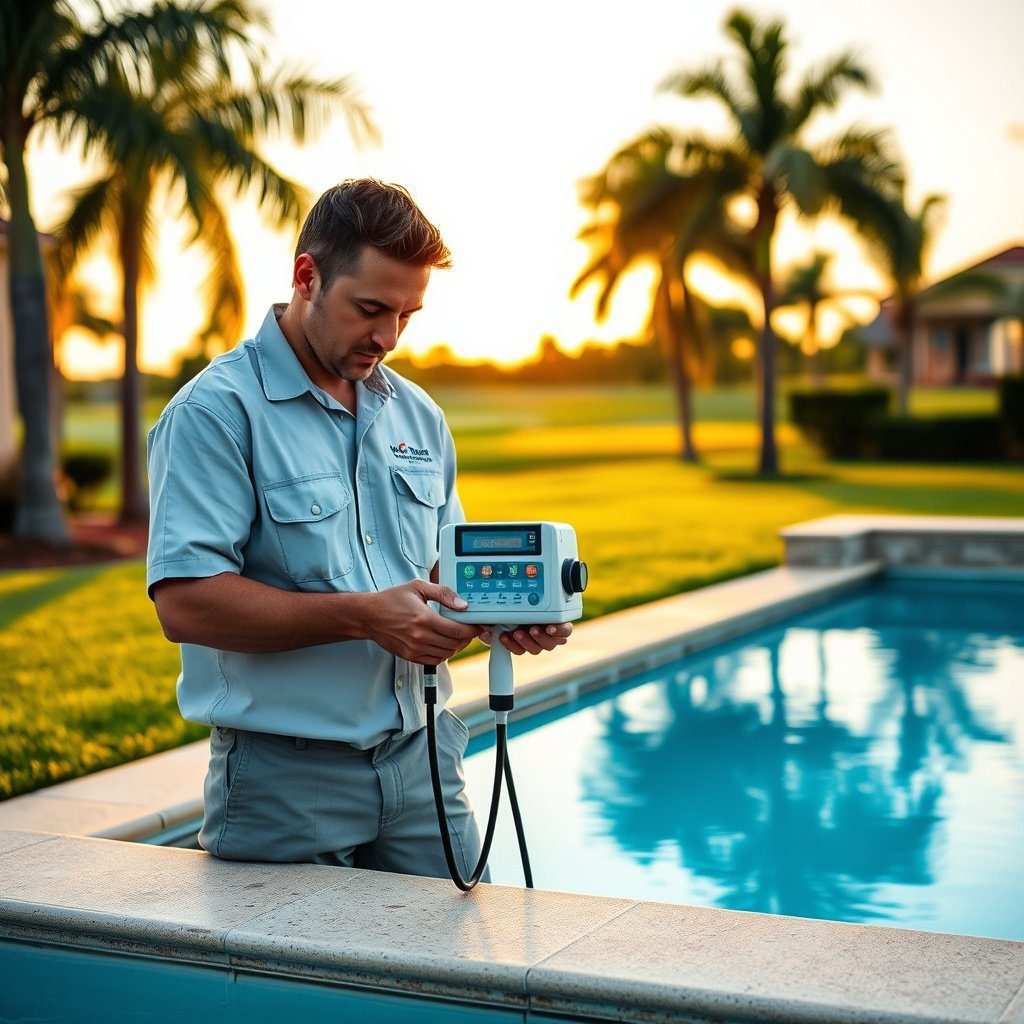What are the best practices for maintaining water quality in commercial pools in Davenport? This refers to the essential methods and techniques used to ensure that water in commercial swimming pools remains clean, safe, and healthy for users.
What are the best practices for maintaining water quality in commercial pools in Davenport? If you manage a commercial pool, ensuring optimal water quality is crucial for the safety and enjoyment of your guests.
In this post, you will discover effective strategies and tips that can help you maintain crystal-clear water, prevent algae growth, and keep your pool inviting all season long.
Join us as we dive into the best practices that will not only enhance the swimming experience but also prolong the life of your pool equipment.

What are the Best Practices for Maintaining Water Quality in Commercial Pools in Davenport?
Maintaining water quality in commercial pools is crucial for ensuring the safety and satisfaction of swimmers. Understanding key concepts like pH balance, chlorine levels, and total alkalinity is the first step to achieving optimal water conditions.
pH balance refers to the level of acidity or alkalinity in the water. Ideally, commercial pools should maintain a pH level between 7.2 and 7.8. This range is essential for effective chlorine performance and swimmer comfort.
Chlorine levels should be kept at 1-3 parts per million (ppm) to effectively sanitize the water. Total alkalinity, on the other hand, acts as a buffer for pH levels and should be maintained between 80-120 ppm. Understanding these terms is vital for pool operators.
The Importance of Maintaining Water Quality for Commercial Pools
High water quality in commercial swimming facilities offers several benefits. Firstly, it ensures health safety for swimmers by reducing the risk of infections and skin irritations.
Moreover, compliance with local regulations is critical. In Davenport, maintaining water quality helps pool operators avoid fines and legal issues, contributing to the longevity and success of their businesses.
Additionally, satisfied customers are more likely to return. Clean, well-maintained pools enhance guest experiences, which is especially important for hotels and gyms in Davenport.
Choosing the Right Equipment and Supplies for Effective Pool Maintenance
Selecting appropriate equipment and supplies is vital for maintaining water quality. Look for efficient and durable tools that are compatible with existing systems.
Investing in high-quality filters and pumps will ensure optimal water circulation and sanitation. For instance, variable speed pumps can save energy while effectively filtering water.
Eco-friendly products are a great choice for maintaining water quality while being kind to the environment. Companies like Jolly Family specialize in using sustainable solutions for pool cleaning and maintenance.
Step-by-Step Guide to Maintaining Water Quality in Commercial Pools
To maintain water quality effectively, start with regular testing of water chemistry. Use test kits or digital testers to measure pH, chlorine, and alkalinity levels at least twice a week.
Next, establish a cleaning routine. This includes skimming debris, vacuuming the pool floor, and brushing walls regularly. Keeping the pool clean helps prevent algae growth and cloudy water.
Don’t forget to maintain the equipment as well. Regularly check and clean filters and pumps to ensure they are functioning efficiently.
Advanced Tips and Best Practices for Professional Pool Maintenance
Experienced pool operators can benefit from advanced techniques. For instance, optimizing chemical usage based on water tests can save costs and enhance water clarity.
Seasonal maintenance strategies are also essential. In Davenport, consider adjusting cleaning schedules and chemical balances based on weather conditions and pool usage.
Leveraging technology for monitoring water quality can provide real-time insights. This can help pool managers make data-driven decisions to improve maintenance practices.
Common Mistakes in Pool Water Maintenance and How to Avoid Them
One common mistake is neglecting regular water testing. This can lead to imbalanced chemical levels, causing skin irritations and unsafe swimming conditions.
Another pitfall is overusing chlorine, which can result in strong odors and discomfort for swimmers. Balancing chlorine levels correctly is crucial to maintaining a safe environment.
To ensure water quality, pool managers should establish regular maintenance schedules and avoid shortcuts. For example, skipping skimming or vacuuming can lead to larger problems in the long run.
Assessing Water Quality Issues: A Local Gym Case
A local gym in Davenport has noticed an increase in skin irritations among its members. The manager should start by testing the water for pH and chlorine levels to assess the situation.
If levels are off, adjusting the chemicals accordingly can help. Regular maintenance practices, such as cleaning filters and ensuring proper circulation, should also be enforced.
Preventing Algae Growth: A Hotel’s Dilemma
A hotel in Davenport struggling with algae growth can implement several best practices. First, ensure that the chlorine level is adequate and that the water is regularly circulated.
Additionally, using algaecides as a preventative measure can help maintain clear water. Regularly brushing the pool walls can also disrupt algae growth.
Balancing Chlorine Levels: A Community Pool Concern
The owner of a community pool in Davenport has received complaints about a strong chlorine smell. To balance chlorine levels without compromising safety, they should test the water regularly.
Adjusting the pH level can improve chlorine effectiveness. It’s also beneficial to consider shock treatments to reset chemical levels when necessary.
Restoring Water Clarity: A Spa’s Challenge
A spa in Davenport facing persistent cloudy water should first check for proper filtration. Clogged filters can hinder water clarity despite regular chemical treatments.
Additionally, testing for total dissolved solids (TDS) can provide insights into water quality issues. If TDS levels are high, draining and refilling the pool may be necessary.
Finally, ensuring that all chemical treatments are applied correctly can help restore water clarity over time.
In conclusion, maintaining water quality in commercial pools requires diligence and expertise. With over 10 years of experience, Jolly Family offers trusted pool cleaning services in Davenport to keep your pool safe and sparkling clean.
How Can I Help You
Maintaining water quality in commercial pools is essential for ensuring a safe and enjoyable experience for all guests. At Jolly Family, with over 10 years of experience serving Davenport and surrounding areas, we understand the importance of regular pool cleaning and water treatment. Utilizing eco-friendly products, we ensure that your pool remains not only sparkling clean but also safe for everyone. Regular preventative maintenance of pool decks and equipment, along with filter and pump cleaning, can significantly enhance water quality. We pride ourselves on our guaranteed quality and trusted professionals, which means you can relax knowing that your pool is in capable hands. If you’re looking to optimize your pool’s water quality, consider partnering with a fully insured company like ours, which is dedicated to providing fast and efficient services tailored to your needs. Let’s keep your commercial pool a refreshing oasis for your patrons!
FAQ
What are the essential steps to keep commercial pool water clean in Davenport?
To maintain clean water in commercial pools, start with regular testing of pH and chlorine levels at least twice a week. Ensure the pH is between 7.2 and 7.8 and chlorine levels are between 1-3 ppm. Additionally, implement a routine cleaning schedule that includes skimming debris, vacuuming the pool floor, and brushing walls. Regularly backwash filters and check for any clogs. Finally, consider installing an automated water treatment system for consistent monitoring. These practices not only enhance water clarity but also ensure the safety of your guests.
How often should I test the water quality in my commercial pool?
For commercial pools, testing water quality should be performed at least twice a week, or more frequently during peak usage times. Regular testing helps identify imbalances in pH, chlorine, and other chemicals that can affect water safety. If you notice fluctuations in usage due to events or seasonal changes, increase testing frequency. Implementing a systematic schedule for testing will help you maintain optimal water quality and comply with local health regulations, ensuring a safe swimming environment for your patrons.
What are the common signs of poor water quality in a commercial pool?
Common signs of poor water quality include cloudy water, unpleasant odors, and skin irritation among swimmers. If you notice a greenish tint or algae growth, it’s a clear indicator of unbalanced chemicals. Additionally, if the water feels slippery or causes eye irritation, it may be due to high levels of chloramines. Regularly check chemical levels and observe these visual cues. Addressing these issues promptly will not only protect your guests’ health but also maintain the pool’s reputation.
What role do pool filters play in maintaining water quality?
Pool filters are essential for maintaining water quality as they remove debris, dirt, and contaminants from the water. A properly functioning filter helps to keep the water clear and healthy, which is crucial for commercial pools with high usage. It’s important to clean or replace filter cartridges regularly and backwash sand or DE filters as needed. Ensure that your filtration system is appropriately sized for your pool’s volume. Investing in quality filtration technology can significantly enhance the overall water quality and reduce chemical usage.
How can I prevent algae growth in my commercial pool?
To prevent algae growth, maintain proper chemical balance with regular testing of pH and chlorine levels. Ensure that the chlorine level is within the recommended range and shock the pool weekly, especially during warm months. Regular cleaning, including brushing the walls and floor, helps remove algae spores before they can establish. Additionally, consider using algaecides as a preventive measure. Installing proper circulation and filtration systems also plays a critical role in keeping water moving and reducing stagnant areas where algae can thrive.
What are the best practices for adding chemicals to commercial pool water?
When adding chemicals to commercial pool water, always follow the manufacturer’s instructions for dosage and safety. Use a test kit to measure current chemical levels before adding any new products. Add chemicals in the evening to prevent sunlight from degrading them, and ensure the pool is not in use during this time. Always pre-dissolve granular chemicals in a bucket of water before adding them to the pool to prevent localized high concentrations. Proper handling and application of chemicals not only protect swimmers but also extend the life of your pool equipment.
How do I ensure compliance with local health regulations for pool water quality?
To ensure compliance with local health regulations, familiarize yourself with your area’s specific guidelines regarding pool water quality. Regularly test and document water quality metrics such as pH, chlorine levels, and turbidity. Keep a log of maintenance activities and any chemical treatments performed. It’s also beneficial to undergo routine inspections by local health authorities and address any recommendations promptly. By staying informed and proactive, you can maintain a safe environment for swimmers while adhering to regulatory requirements.



